Generative Engine Optimization (GEO): The New Paradigm in Search
Why GEO is the most critical direction for modern SEO strategies

Generative Engine Optimization (GEO) represents a new paradigm in search, driven by large language models (LLMs), and has become a critical direction in modern SEO strategy. While traditional SEO was built on links and ranking positions, GEO is built on language—aiming not only for a high ranking in search results but for direct inclusion in the answers generated by AI models.
- Visibility Goal: In the era of GEO, visibility means appearing in AI-generated answers from models like GPT-4o, Gemini, Claude, Google AI Overviews, or Yandex’s Alice. In 2025, the SEO specialist’s task is ensuring visibility both in traditional search rankings and as a cited source in AI-driven results.
- Content and Context First: Unlike traditional SEO, which rewarded keyword precision and repetition, generative engines favor well-structured, context-rich, and meaningful content. GEO focuses on how well the content answers the context of a user’s query, not just the keywords.
- How LLMs Work: Large language models (LLMs) like GPT-4o, Gemini, and Claude analyze, remember, and generate answers through personalized, multi-source synthesis, fundamentally changing how content is discovered and optimized.
- New Metrics: Beyond CTR, a new KPI emerges: the “Mention Rate”—how often your brand or content is cited in AI-generated answers. In GEO, how your brand is “encoded” at the AI level becomes a new competitive advantage.
- Complex Queries & Sessions: AI-native queries are longer (average of 23 words vs. 4 in traditional search) and sessions deeper (average of 6 minutes), reflecting richer user intent.
- Integration with Traditional SEO: GEO does not replace SEO—it layers on top of it. Strong on-page and off-page SEO is still essential for appearing in generative results. High rankings in commercial queries remain a prerequisite, but GEO expands the SEO playbook with new tactics.
- Business Model Differences: Unlike free search engines, most LLMs are subscription-based services. This shifts the incentives around displaying external content, making optimization strategies more nuanced.
- Continuous Learning: Success in GEO requires constant adaptation, monitoring technological progress, updating content regularly, and measuring AI visibility alongside traditional rankings.
GEO is optimization for being selected and presented as a trusted source inside AI-generated answers—not just for climbing the SERP ladder. It shifts the focus from page rankings to relevance and value for language models. In practice, this means creating structured, meaningful, and context-aware content that LLMs are more likely to pull into synthesized answers.
Generative search is not a distant future—it’s here today. Businesses that adapt their SEO strategies to GEO will secure a powerful competitive advantage. By aligning content with the way LLMs parse and synthesize information, brands can ensure visibility not only in search results but in the AI-powered experiences that shape how users discover and trust information in 2025 and beyond.
Keeping up with GEO can be overwhelming. SalesPilot is an advanced seo ai extension that helps you analyze AI-friendliness, monitor structured data, and track whether your site is being picked by generative engines. With AI-powered recommendations, you can adapt faster and maximize your visibility in both traditional and AI-driven search.
Free Chrome extension • GEO analysis • Stay visible in AI-powered search